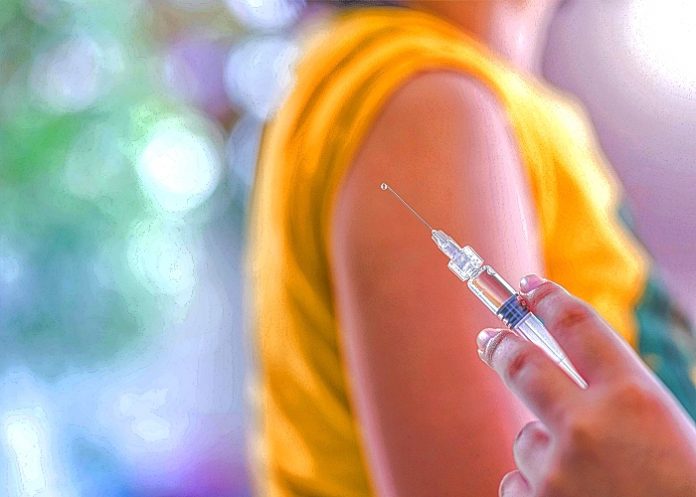Medical professionals are increasingly being approached by women who have experienced changes to periods and unexpected vaginal bleeding after being vaccinated, writes Dr Victoria Male of Imperial College London, in the BMJ. Yet, despite over 30,000 such “yellow card” occurrences in the UK, they are not listed by the Medicines and Healthcare Products Regulatory Agency as common side effects of COVID-19 vaccination.
“Most women who report changes to menstrual cycles after vaccination find they return to normal in the next cycle,” writes Male. “Importantly, there is no evidence that COVID-19 vaccination adversely affects fertility.
“[But] failing to thoroughly investigate reports of menstrual changes after vaccination is likely to fuel these fears.”
The reports were made to MHRA’s “yellow card surveillance scheme” for adverse drug reactions up to 2 September 2021, across all COVID-19 vaccines currently offered.
Male writes further:
In clinical trials, unintended pregnancies occurred at similar rates in vaccinated and unvaccinated groups. In assisted reproduction clinics, fertility measures and pregnancy rates are similar in vaccinated and unvaccinated patients.
The MHRA states that evaluation of yellow card reports does not support a link between changes to menstrual periods and COVID-19 vaccines since the number of reports is low relative to both the number of people vaccinated and the prevalence of menstrual disorders generally.
However, the way in which yellow card data are collected makes firm conclusions difficult. Approaches better equipped to compare rates of menstrual variation in vaccinated versus unvaccinated populations are needed, and the US National Institutes of Health has made £1.2m available to encourage this important research.
Menstrual changes have been reported after both mRNA (like the Pfizer and Moderna jabs) and adenovirus vectored COVID-19 vaccines (AstraZeneca), suggesting that if there is a connection, it is possibly a result of the immune response to vaccination rather than a specific vaccine component. Vaccination against human papillomavirus (HPV) has also been associated with menstrual changes. Indeed, the menstrual cycle can be affected by immune activation in response to various stimuli, including viral infection: in one study of menstruating women, around a quarter of those infected with SARS-CoV-2 experienced menstrual disruption.
Biologically plausible mechanisms linking immune stimulation with menstrual changes include immunological influences on the hormones driving the menstrual cycle or effects mediated by immune cells in the lining of the uterus, which are involved in the cyclical build-up and breakdown of this tissue. Research exploring a possible association between COVID-19 vaccines and menstrual changes may also help understand the mechanism.
Although reported changes to the menstrual cycle after vaccination are short-lived, robust research into this possible adverse reaction remains critical to the overall success of the vaccination programme. Vaccine hesitancy among young women is largely driven by false claims that COVID vaccines could harm their chances of future pregnancy.
Failing to thoroughly investigate reports of menstrual changes after vaccination is likely to fuel these fears. If a link between vaccination and menstrual changes is confirmed, this will allow people to plan for potentially altered cycles. Clear and trusted information is particularly important for those who rely on being able to predict their menstrual cycles to either achieve or avoid pregnancy.
We are still awaiting definitive evidence, but in the interim how should clinicians counsel those who have experienced these effects? Initially, they should be encouraged to report any changes to periods or unexpected vaginal bleeding to the MHRA’s yellow card scheme. This will provide more complete data to facilitate research into any link and signal to patients that their concerns about vaccine safety are taken seriously, building trust.
The Royal College of Obstetricians and Gynaecologists and the MHRA recommend that anyone reporting a change in periods persisting over several cycles, or new vaginal bleeding after the menopause, should be managed according to the usual clinical guidelines for these conditions.
One important lesson is that the effects of medical interventions on menstruation should not be an afterthought in future research.
Clinical trials provide the ideal setting in which to differentiate between menstrual changes caused by interventions from those that occur anyway, but participants are unlikely to report changes to periods unless specifically asked. Information about menstrual cycles and other vaginal bleeding should be actively solicited in future clinical trials, including trials of COVID-19 vaccines.
Separately, The Independent reports that Dr Alison Cave, chief safety officer at the MHRA, said they were “closely monitoring reports of suspected menstrual disorders” through the “robust” yellow card scheme.
“The yellow card scheme is one of several sources of evidence we use when evaluating vaccine safety. Based on our rigorous safety monitoring, current evidence shows no link with any changes in periods or symptoms, nor is there any evidence to suggest the vaccines will affect fertility. This is also the conclusion of the Commission on Human Medicines.”
And Dr Jo Mountfield, vice president of the Royal College of Obstetricians and Gynaecologists, says: “We understand that any changes to periods after a COVID-19 vaccine can be concerning. We want to reassure women that any changes generally revert back to normal after one or two cycles. There is no evidence suggesting these temporary changes will have any impact on future fertility or ability to have children. But we support calls for more research to understand why women may be experiencing changes to their cycle after a vaccine.”
British Medical Journal article – Menstrual changes after covid-19 vaccination (Open access)
See more from MedicalBrief archives
Research turns to potential affect of COVID vaccines on menstrual cycle
Unpacking COVID vaccination's effect on fertility and sexual functioning
Effectiveness of Pfizer vaccine in pregnancy — Clalit Health Services study

